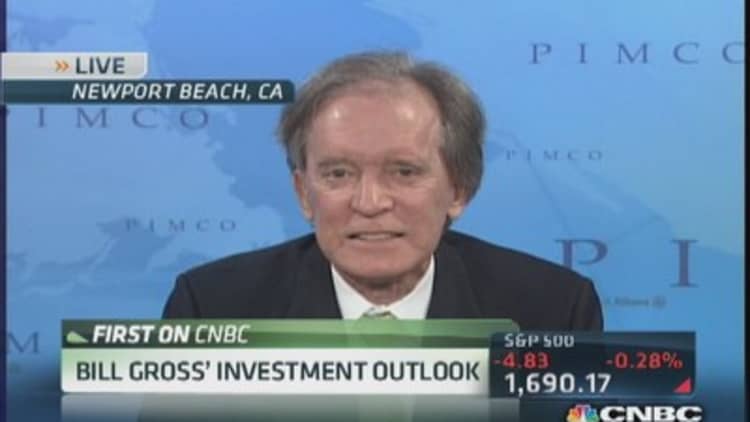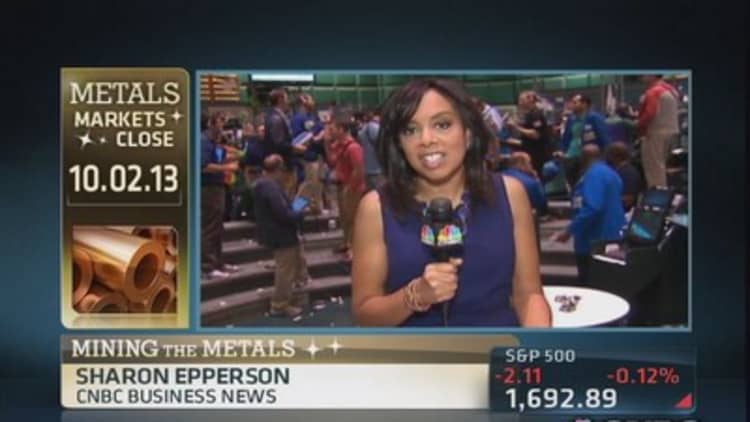Stocks eased off session lows but still closed in the red Wednesday, amid mounting worries that the ongoing budget battle in Washington could eventually lead to a failure to raise the country's debt ceiling.
(Read more: After-hours buzz: GNC, Praxair, Del Monte & more)
Major U.S. Indexes
The Dow Jones Industrial Average declined 58.56 points to end at 15,133.14, dragged by United Tech and American Express. The blue-chip index fell nearly 1 percent at its session low.
The slipped 1.13 points to finish at 1,693.87. And the Nasdaq dipped 2.96 points to close at 3,815.02.
The CBOE Volatility Index (VIX), widely considered the best gauge of fear in the market, jumped above 16.
Among key S&P sectors, industrials led the laggards, while energy closed higher.

The partial shutdown of the federal government entered its second day, with an estimated 800,000 federal employees furloughed. Experts say even if the shutdown issue is resolved, investors will have a bigger hurdle to jump when the Treasury Department will exhaust its borrowing limit on Oct. 17. Unless Congress votes to raise the debt ceiling, the U.S. will default on its debt for the first time ever.
(Read more: The government shutdown probably kills 'Octaper')
"We believe the U.S. government shutdown over the continuing resolution should be primarily seen through one prism—does it increase or decrease the chances of a smooth resolution to the debt ceiling? For now, the markets seem to believe that this shutdown will cause only minor disruption and will, at the very least, not worsen the debt ceiling negotiations—and we agree," Barclays analysts Hamish Pepper and Ajay Rajadhyaksha said in a research note.
Negotiations continued in Washington as Senate Majority Leader Harry Reid reportedly sent a letter to and called House Speaker John Boehner offering budget talks. But the conversation did not seem to lead to a resolution on the ongoing shutdown.
President Barack Obama will address the government shutdown, the roll-out of the Affordable Care Act and the looming debt ceiling in an exclusive interview on CNBC. The interview will be aired at 4pm ET.
(Read more: If you could ask the president anything, what would it be?)
Separately, Obama met with top banking CEOs at the White House.
Goldman Sachs CEO Lloyd Blankfein urged Congress not to use threats of defaulting on U.S. debt as a "cudgel" to get policy changes, adding that business leaders agree the failure to raise the debt ceiling would lead to "extremely adverse" consequences.
Michael Corbat of Citigroup, Jamie Dimon of JPMorgan and Brian Moynihan of Bank of America were among other high-profile bank CEOs at the meeting.
Meanwhile, Senate Majority Leader Harry Reid and House Speaker John Boehner spoke by phone, with Reid saying he wants "Clean" spending bill before the conference.
"Should any of these uncertainties and Washington wrangling fuel additional market pullback in the near term, we believe these dips would represent buying opportunities for investors," wrote Stuart Freeman and Scott Wren of Wells Fargo Advisors. "We believe that the breadth of growing within the economy is still likely to bring us roughly 5 percentage points of operating earnings growth next year and a further strength in investor confidence alongside some P/E expansions."
Wells Fargo Advisors maintained its 1,850 to 1,900 target range for the S&P 500 index for year-end 2014.
Equities were also pressured by a weaker-than-expected private-sector jobs report. Private employers added 166,000 jobs in September, according to the ADP National Employment Report, missing expectations for a gain of 180,000. The ADP data is usually seen as a preview to the widely-watched monthly government jobs report, which is likely to be delayed due to the shutdown.
"Employment growth picked up in the past two months, but it remains disappointing given all the fiscal and monetary stimulus that is still being pumped into the economy," said David Santschi, CEO of TrimTabs.

Blackberry reversed earlier losses to close higher following a report that the smartphone maker has drawn interest from private-equity firm Cerberus and at least one other investor, according to Dow Jones. The troubled smartphone company has shed more than 30 percent year to date.
Monsanto declined after the agricultural biotechnology company posted quarterly results that missed expectations and handed in full-year earnings that also fell short of estimates.
Microsoft was in the spotlight after three of the top 20 investors in the software giant lobbied to press for Bill Gates to step down as chairman of the company he co-founded, according to sources. Shares eventually shook off their initial losses to close higher.
Alcoa slid after Deutsche Bank cut its rating on the aluminum producer and former Dow component to "sell" from "hold."
Empire State Realty Trust rose in its trading debut on the NYSE after the owner of the Empire State Building priced at $13 a share, the lower end of of its expected range. And real estate brokerage franchiser RE/Max surged more than 20 percent in its debut after pricing its 10-million-share initial public offering at $22 a share.
Also on the economic front, weekly mortgage applications slipped last week as a drop in demand for purchase loans outweighed an increase in refinancing demand, according to the Mortgage Bankers Association.
Investors will be looking ahead to third-quarter earnings results over the next several weeks. Companies issuing negative outlooks for the quarter outnumber positive ones by 5.2-to-1, the most negative since the 6.3-to-1 ratio in the second quarter, according to the latest data from Reuters.
Technology is the sector with the highest number of negative outlooks.
European shares remained in the red after the ECB left key its interest rates unchanged, as expected.
"We view this recovery as weak, as fragile, as uneven," said ECB president Mario Draghi at a press conference following the decision. He reiterated his previous commitment to keeping rates at present or lower levels for an extended period of time.
Meanwhile, Italian stocks traded higher after the government of Prime Minister Enrico Letta won a Senate confidence vote. The dramatic turnaround came after former Prime Minister Silvio Berlusconi said he would support Letta after an increasing number of his party members rebelled against the move to pull down the government.
—By CNBC's JeeYeon Park (Follow JeeYeon on Twitter: @JeeYeonParkCNBC)
On Tap This Week:
THURSDAY: Challenger job-cut report, jobless claims, factory orders, ISM non-mfg index, natural gas inventories, Fed's Fisher speaks, Fed Gov Powell speaks, Fed balance sheet/money supply; Earnings from Constellation Brands
FRIDAY: Nonfarm payrolls, Fed's Kocherlakota speaks
What's Trending on CNBC.com:


